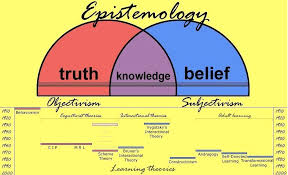
Epistemology
This is an outline that I wrote as an “argument sketch” that my TA gave me a 19/20 for. His comments were: “your thesis is too general to be established with a page but you did have an interesting argument for it.
I suggest you should rephrase your thesis so that it is “defensible.”
We also do “journal entries” on readings that summarize what we’ve read so if you provide an e-mail or something I could send those along to you.
Thesis: It is equally logical to believe that God exists, as it is to believe that God does not exist.
I. Believing that God does not exist ? not believing that God does exist
A lack of positive belief is not the same thing as the presence of a negative belief. While it is perfectly fine to not believe either which way, I believe
it is hypocritical to assert that God does not exist, calling the believer’s argument invalid for lack of sufficient evidence, since there is not sufficient
evidence for God’s nonexistence either. Both beliefs (does exist/does not exist) are of equal logical grounds (and are valid).
II. There is no physical evidence that God does or does not exist
Beliefs that are based on false assumptions are still logically valid following the assumption. ( If P?Q and ¬P, the statement P?Q is still true.) Since there is no physical evidence for either argument, it is impossible to determine the truth value of P, and therefore both arguments are logically valid
following the initial assumptions they claim. I believe that, in fact, it is truly impossible to prove with 100% that any initial assumption is true. Even
physical evidence of widely accepted notions, for example, is detected through imperfect human sensory organs. “I see that the chair is blue?The chair is blue” is 1. Valid and is 2. The assumption that your eyes are trustworthy is impossible to verify. (the argument that you could refer to someone else, asking
“is the chair blue?” fails because no matter how many people you ask, how do you know that you can trust them, or that they can trust their own eyes? And
what does it really mean to be called blue, anyway?)
III. Metaphysical “evidence” is not invalid
Arguers against metaphysical evidence’s validity do not, I think, fully understand what it means to be called valid. Is any evidence provable with 100%
certainty to be true? In Mathematics, for example, proofs and deductions that bring about new knowledge are almost always based on Theorems or Axioms (but rarely “Laws”). Therefore, while all deductions from these theorems are logically valid, should the Theorem be proven false, the deductions are no longer applicable to the universe in which the theorem as been proven false but they are STILL logically valid deductions. If any belief can be accepted as properly basic, the support from which other arguments can draw, then surely any belief that an individual holds in this regard is valid to draw deductions from.
IV. Applicability ? logically valid
The problem with evidence drawn from the metaphysical realm is that it is very difficult to externally verify. If “The Theorem of Sight” claims that eyes are trustworthy, and you see something that you might not at first believe, it is quite simple to ask your neighbor, “Do you see the same thing?”
Now while this does not necessarily prove that you have seen correctly (because though it is unlikely it is possible that both your and your neighbor’s and anyone else’s eyes are faulty) it definitely does support the theorem and therefore follows that the valid deduction drawn from the sight is also applicable because P seems to be true (though NOT proven true). Beliefs based on metaphysical evidence are not as easy to develop a trust for in this way.
If “The Theorem of Revelatory Experience” yields some profound revelation or understanding (yields a belief in God, for example) and you doubt what you have experienced, it is not as easy to ask your neighbor “have you experienced the same thing?” Perhaps they have, in the past, had similar revelations, but an experience like this is very unique to an individual, very personal. And so, while can feel like very strong evidence, it is impossible to externally verify. Any deductions drawn from this experience, though are STILL VALID deductions, based on the premise that you can trust your revelatory experience.
However, it is difficult to prove this P; how do you know that you can trust this? No one else has experienced exactly the same, so how can you trust that what you’ve experienced is trust-worthy? The answer is you can’t. Therefore the applicability of this P?Q is unverifiable. You simply cannot tell whether P is true/can be trusted. This is where the idea of faith comes in. Faith is trusting in your premise without external validation, supposing it to be true. In my previous example, responses from other’s with regard to what image their eyes produce, yields confidence that what you’ve seen is correct, but it does not prove it correct.
In the same way, faith yields confidence in your premise (that you can trust a revelatory experience) without proving it definitely.
Therefore the deductions from both physical and metaphysical evidences are of the same logical validity, though one is easier to trust as applicable.
We can write this or a similar paper for you! Simply fill the order form!




